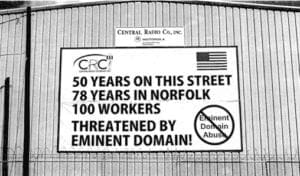VA Property Owners Win Eminent Domain, Freedom of Speech Cases
This article was featured in our weekly newsletter, the Liberator Online. To receive it in your inbox, sign up here.
A fight between a Virginia public university and a private radio station has ignited an impromptu debate on eminent domain abuse. And while eminent domain laws and their consequences are seldom discussed by the mainstream media, people start to pay attention when both private property and freedom of speech are threatened.
Recently, a Virginia court sided with property owners who had been threatened with eminent domain laws in Norfolk, VA.
A local radio station known as Central Radio Company was targeted by the city in what appears to be an effort to expand Old Dominion (ODU), a public university. But the radio station wasn’t the only business on the hit list. A privately-owned apartment building was also under threat.
It all started in 1998, when the Norfolk City Council approved the Hampton Boulevard Redevelopment Project, which gave ODU the legal means to expand eastward. Up until when the plan was approved, the area was a mix of commercial and industrial properties, but it also counted with a few privately owned student apartments. But since the land wasn’t being used for educational purposes only, ODU pushed local housing authorities to resort to eminent domain laws.
At the time, Virginia’s law allowed authorities to take properties away from its rightful owners for economic development purposes as long as most targeted properties had been deemed condemned due to decay. Since then, local housing authorities acquired more than 160 properties, which were all turned over to the university’s real estate foundation. The spot is now home to ODU’s Ted Constant Convocation Center, a research park, and a cluster of apartment buildings and businesses for students.
But as the university moved to push Central Radio Company and two other companies out of their land, they fought back.
In 2011, PKO Ventures, the owner of apartment buildings under threat, Central Radio, and Norva Plastics took the battle against the university to a Circuit Court, but the effort was unsuccessful.
In June, PKO appealed the decision to the state Supreme Court. The company argued that recent changes to the state eminent domain law prohibited ODU from pushing property owners out of the area.
In 2007, the General Assembly adopted changes to the state law that limited the authority’s use of eminent domain. After the changes, local authorities were prohibited from taking land for economic development.
But the changes also affected how authorities were expected to target properties that had been condemned for blight, making the condemnation of entire areas illegal. Only specific properties were allowed to be taken, and only if they had been deemed condemned over decay. While the changes were adopted in July of 2007, the assembly added a provision that allowed agencies in the middle of projects to continue to acquire land. The provision had an expiration date: July 2010.
While the housing authority argued that resorting to eminent domain against PKO and others was legal because proceedings started prior to the deadline, landowners claimed their plots hadn’t been formally acquired until later.
As this legal fight continued, another one had just started to brew.
Central Radio had had a large sign placed on the side of its building promoting its opposition to eminent domain abuse. In light of the ongoing legal battle, the city eventually decided to go after Central Radio by claiming that the company was in violation of city advertising statuses.
A second lawsuit was filed by the radio company, arguing that the city’s claims hoped to undermine the company’s First Amendment rights. The 4th Circuit Appeals Court first sided with the city, but once Central Radio petitioned the case to the Supreme Court, the 4th Circuit Appeals Court was forced to take the case back.
Before booting the case back to the appeals court, the Supreme Court ordered it to take Reed v. Town of Gilbert into account. The Supreme Court had recently ruled in favor of the private party in the case, reaffirming that government entities have no right to impose content-based restrictions on speech.
The appeals court finally sided with Norfolk’s Central Radio.


























